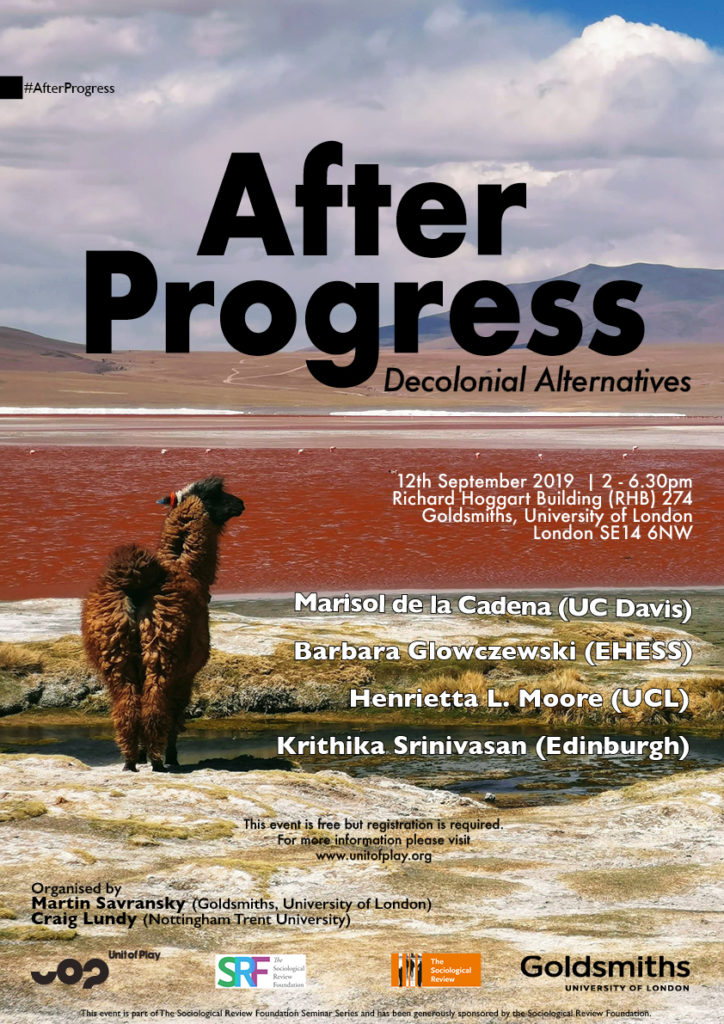
Wed 12th September 2019 | 2-6.30pm
Richard Hoggart Building (RHB) 274
Goldsmiths, University of London
New Cross, London, SE14 6NW
Can we reimagine human and more-than-human arts of living and flourishing from the ruins of the modern idea of progress? Continuing our collective experimentation with this question, in the second session of the After Progress symposium series we’re keen to discuss experiments, practices, experiences, concepts, challenges and cosmo-visions of collective arts of living and flourishing with others in and out of Europe. Indeed, just as decolonisation movements were instrumental in the critique of the deleterious global consequences of the modern imagery of progress, it is also on the margins and in the interstices of the modern world-system that, today, divergent alternatives to progress are being collectively invented and experimented with. Some (like “Buen vivir”, “Swaraj”, “Degrowth”, or “Permaculture”) are now fairly well-known and much discussed, but there is still a profusion of other, plural and concrete experiences and experiments which may be yet to be named but whose practices upend the colonial, developmental, and extractivist consequences of the modern dream of progress, making it present that other ways of living and flourishing with others –humans and more– are not only possible but underway. Exploring practices and possibilities for living and flourishing otherwise, this session will engage in the ongoing and unfinished experiment of decolonizing progress and composing other worlds in its wake.
Speakers include:
Marisol de la Cadena (University of California, Davis).
Species and Not Only: onto-epistemic openings towards a world of many worlds
A mountain that is not only such—my proverbial example– offers the grounds for this talk. It is persistently not only, the phrase around which I build my conversation with you. Urged by that mountain, I have used the phrase to talk about complex entities, those that occupy the same space, even overlap, yet also diverge. I propose that “not only” performs ontic-openings, and has the capacity to indicate a potential emergence that could challenge what we know, the ways we know it and even suggest the impossibility of our knowing, without such impossibility canceling the emergence. This phrase shares the post-plural vocation of the cyborg and the “more than one, less than many” of partial connections. In this talk, using ‘not only’ I try to open up ‘species’—the concept, and its practice– to what might exceed it, yet also be within it. With the work of many persons, I will propose that animals, plants, and humans may bespecies and not only such. My purpose is to offer a decolonial proposal to think about “multispecies” as an emergence through a world of many worlds. In such a world, “when species meet,” the practice and notion of species may be insufficient, and constrain imagination towards decolonial justice. Notions and practices world worlds.
What to defend? The ZAD (zone to defend) movement and Indigenous cosmovisions
Is struggling against big projects, like an airport in Notre-Dame des Landes or gold mining in the Amazon of French Guiana enough to establish an alternative mode of existence? Certainly during the time of the struggle, but how to move on afterwards? For ten years, activists in France occupied the land, squatted on old farms that were slated to be destroyed, built shelters and invented new collective ways to live together. During the same time native Americans in French Guiana tried to stop the deadly mercury pollution of their rivers by clandestine gold miners, and constructed national and international alliances against the Russian-Canadian “Mountain of Gold” project. We will discuss what is at stake when new forms of economic or religious colonisation replace or play hand in hand with the State.
Henrietta L. Moore (University College London)
The Future of Agriculture
Multispecies ethnography is currently enjoying a love affair with plants. Tending gardens is one of humanity’s oldest pursuits and one which has engaged the attention of ethnographers, from tending enormous yams to building hydroponic green towers. Demography has driven increases in agricultural productivity, and is in the limelight once again with questions about how we intend to feed 9 billion people on the planet. The scale of this challenge and the ecological threat from collapsing resources has generated a sense of impending crisis, but remarkably little action. The frames of reference tend towards climate change and the anthropocence, but perhaps a more fruitful approach to agriculture might begin with questions about progress and productivity. Instead of focusing on denial, scepticism and ignorance as the main drivers of inaction, we might turn instead to longer running ideas of value, generation and excess. This paper discusses why agriculture and not just climate change is the big challenge, and whether forms of hope might be possible, and from whence they might arise.
Krithika Srinivasan (University of Edinburgh)
Re-placing the social
The pursuit of ‘development’ has been a key hallmark, and indeed, driver, of the Anthropocene. Development is usually justified in terms of human wellbeing and progress but nonetheless often has negative impacts on people. Indeed, there is now widespread recognition that humanity’s quest for progress is endangering its (humankind’s) very conditions of possibility. In this talk, I explore the manners in which the human and human wellbeing are understood and pursued in the contemporary world. I argue that particular entrenched notions of what humanity is and should be are at the foundation of the social and ecological troubles facing today’s societies, and develop some thought experiments on re-visioning the human and human wellbeing. My purpose in doing this is to suggest that achieving multispecies justice in and after the Anthropocene requires a fundamental re-placement of the social in the rest of the nature.
The event is free, but registration is required due to limited capacity. To register please click here. A small number of BURSARIES for unfunded PhD students/ECRs are available (places will be reserved for these, even if the registration list fills up). Deadline for applications is AUGUST 19TH 2019. For further details on the eligibility criteria and the application process please go here.
This symposium is the second of the After Progress symposium series. The After Progress symposium series co-organised by Dr Martin Savransky(Goldsmiths, University of London) and Dr Craig Lundy (Nottingham Trent University). It is part of the Sociological Review Seminar Series and it is generously funded by The Sociological Review Foundation.
Please tweet about this event by using the hasthag #AfterProgress
